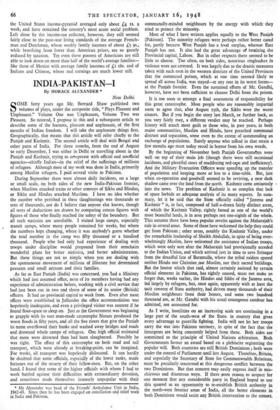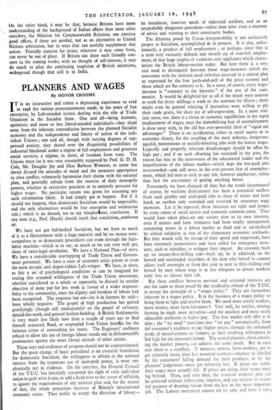INDIA-PAKISTAN-I
By HORACE ALEXANDER * New Delhi.
SOME forty years ago Mr. Bernard Shaw published two volumes of plays, under the composite title, " Plays Pleasant and Unpleasant." Volume One was Unpleasant, Volume Two was Pleasant. So tutored, I propose in this and a subsequent article to describe some of the features, pleasant and unpleasant, of the first months of Indian freedom. I will take the unpleasant things first. Geographically, that means that this article will refer chiefly to the Punjab and Kashmir. The second article will deal with Bengal and other parts of India. For three months, from the end of August to early December, I was either in Delhi or travelling about in the Punjab and Kashmir, trying to cooperate with official and unofficial agencies—chiefly Indian—in the relief of the sufferings of millions of refugees. Although most of my work was done in India, primarily among Muslim refugees, I paid several visits to Pakistan.
During September there were almost daily incidents, on a large or small scale, on both sides of the new India-Pakistan frontier, when Muslims attacked trains or other convoys of Sikhs and Hindus, or Sikhs and Hindus attacked Muslims. I have no idea whether the number who perished in these slaughterings was thousands or tens of thousands, nor do I believe that anyone else knows, though all sorts of deductions are drawn by comparing census figures with figures of those who finally reached the safety of the boundary. But all such statistics are unreliable. I visited large camps, especially transit camps, where many people remained for weeks, but where the numbers kept changing, where it was anybody's guess whether the total number in the camp was fifty thousand or a hundred thousand. People who had only had experience of dealing with troops under discipline would propound from their armchairs wonderful plans for better statistics, and better administration. But these things are not so simple when you are dealing with the spontaneous movement of millions of illiterate but determined peasants and small artisans and their families.
As far as East Punjab (India) was concerned, you had a Ministry which had just assumed office, none of its members having had any experience of administration before, working with a civil service that had just been cut in two and shorn of some of its senior (British) officers. It had no provincial capital to work from. Even after most offices were established in Jullunder the office accommodation was hopelessly inadequate, and even a privileged visitor was content if he found floor-space to sleep on. Just as the Government was beginning to grapple with its vast man-made catastrophe Nature produced the worst floods in fifty years, and all the five rivers that give the Punjab its name overflowed their banks and washed away bridges and roads and drowned whole camps of refugees. One high official estimated that more were drowned than had been slaughtered. Possibly he was right. The effect of this catastrophe on both road and rail transport, which were already at breaking-point, can be imagined. For weeks, all transport was hopelessly dislocated. It can hardly be doubted that some officials, especially of the lower ranks, made fortunes out of the misery of their fellow-men. But, on the other hand, I found that some of the higher officials with whom I had to work battled against their difficulties with extraordinary devotion, and sometimes made themselves intensely unpopular with their
* Mr Alexander was head of the Friends' Ambulance Unit in India, 1942-43. Since then he has been engaged on conciliation and relief work in India and Pakistan. communally-minded neighbours by the energy with which- they tried to protect the minority.
Most of what I have written applies equally to the West Punjab (Pakistan). The minority refugees were perhaps rather better cared for, partly because West Punjab has a food surplus, whereas East Punjab has not. It also had the great advantage of ietaining the Provincial capital, Lahore. But in other respects there seemed to be little to choose. Too often, on both sides, notorious ringleaders in violence were not arrested. It was largely due to the drastic measures taken with such men in the western districts of the United Provinces that the communal poison, which at one time seemed likely to spread all across India, was stayed—at any rate in its worst forms— at the Punjab frontier. Even the sustained efforts of Mr. Gandhi, however, have not been sufficient to cleanse Delhi from the poison.
It is too soon to attempt a final assessment of responsibility for this great catastrophe. Most people who are reasonably impartial seem to agree that, after August 15th, the Sikhs were the worst sinners But if you begin the story last March, or further back, as you very fairly may, a different verdict may be reached. Perhaps history will attach most guilt to those who, in past years, in both major communities, Muslim and Hindu, have preached communal distrust and separation, some even to the extent of commending an exchange of populations. Surely anyone who talked in that strain a few months ago must today recoil in horror from his own words.
By the beginning of November both Punjab Governments were well on top of their main job (though there were still occasional incidents, and plentiful cases of maddening red-tape and inefficiency). And the Military Evacuation Officers were speeding up the transfer of population and keeping more or less to a time-table. But, just when co-operation and goodwill seemed to be reviving, a new dark shadow came over the land from the north. Kashmir came ominously into the news. The problem of Kashmir is so complex that lack of space forbids an adequate analysis of its many aspects. In sum- mary, let it be said that the State officially called " Jammu and Kashmir " is, in fact, composed of half-a-dozen fairly distinct areas, of which the Kashmir Valley, rightly famed as one of the world's most beautiful lands, is in area perhaps not one-eighth of the whole. This autumn there have been popular revolts against the Maharajah's rule in several areas. Some of these have welcomed the help they could get from Pakistan ; other areas, notably the Kashmir Valley, under the remarkable leadership of Sheikh Abdullah, in spite of being over- whelmingly Muslim, have welcomed the assistance of Indian troops, which were only sent after the Maharajah had provisionally acceded to the Indian Union, and which arrived just in time to save Srinagar from the dreadful fate of Baramulla, where the tribal raiders spared neither Hindu nor Christian nor Muslim, nor their sacred buildings. But the horror which that raid, almost certainly assisted by certain official elements in Pakistan, has rightly caused, must not make us forget that, weeks earlier, the Hindus and Sikhs of the Jammu area, led largely by refugees, but, once again, apparently with at least the tacit consent of State authority, had driven many thousands of their Muslim neighbours from their homes, and some two hundred thousand are, as Mr. Gandhi with his usual courageous candour has admitted, not accounted for.
As I write, hostilities on an increasing scale are continuing in a large part of the south-west of the State, in country that gives every advantage to guerrilla fighting. India will not let her troops carry the war into Pakistan territory, in spite of the fact that the insurgents are being constantly helped from there. Both sides are committed to the principle of United Nations arbitration. Both Governments favour an award based on a plebiscite registering the popular will. Both countries are still British Dominions ; both were under the control of Parliament until last August. Therefore, Britain, and especially the Secretary of State for Commonwealth Relations, must be peculiarly concerned at this dangerous conflict between the two Dominions. But that concern may easily express itself in mis- chievous and disastrous ways. If there were reason to suspect for one moment that any considerable party in England hoped to use this quarrel as an opportunity to re-establish British authority in the north-west frontier areas of India, all the better elements in both Dominions would resist any British intervention to the utmost
On the other hand, it may be that, because Britons have more understanding of the background of Indian affairs than most other outsiders, the Minister for Commonwealth Relations can exercise good offices, if these are needed, not as an alternative to United Nations arbitration, but in ways that can usefully supplement that action. Friendly concern for peace, wherever it may come from, can never be out of place. If Britain can show such friendly con- cern in the coming weeks, with no thought of self-interest, it may do much to allay the continuing suspicion of British intentions, widespread though that still is in India.



































 Previous page
Previous page